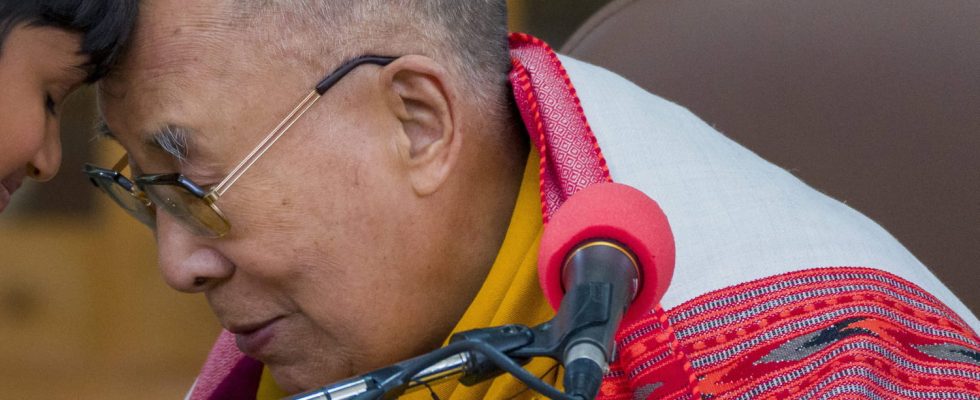The Dalai Lama has just published his apology to an Indian child after the leak of a video where the Tibetan leader asks him to “suck his tongue”. This is not the first inappropriate gesture for the man.
More than a month after the events, a video of the Dalai Lama goes viral. On February 28, the Tibetan spiritual leader offered a child to “suck his tongue”. It happened in Dharamsala, India, a place of exile since 1959. Faced with the outcry of reactions on social networks, the Twitter account of the Nobel Peace Prize winner in 1989 apologizes to the young boys for “the pain that his words were able to cause him” during this hearing organized by the M3M Foundation, the philanthropic branch of the real estate group of the same name.
During this audience where many young people are present, a boy asks the Dalai Lama to be able to give him a hug. In exchange, the monk encourages him to receive a kiss. He then raises her chin to kiss the child’s mouth. The scene makes the assembly laugh, he then sticks out his tongue, addressing the disoriented boy: “Suck my tongue”; he said to him. The Dalai Lama’s statement explains that “His Holiness often teases the people he meets in an innocent and playful way, even in public and in front of the cameras. He regrets the incident.” This message only mentions a “hug” as a gesture that may have affected the child.
A growing list of inappropriate comments
This video is part of a delicate context for the Dalai Lama. The one who universally embodies the movement for Tibetan autonomy had already signaled himself in 2019 by believing that only a “very attractive” woman could succeed him during an interview with the BBC. The Tibetan leader argued that “women, biologically, have more potential to show affection and compassion”.
Relaunched by journalist Clive Myrie on the seriousness of his remarks, the Buddhist monk insisted: “No it’s true! If a woman Dalai Lama comes along, she must be very attractive. Otherwise it’s not much use”. His communications department then tries to backpedal by saying that “His Holiness has opposed the treatment of women as objects and has consistently emphasized the need for people to connect on a deeper level, rather than being hostages”.
In 2013, it was at the microphone of CBS that he expressed his taste for “attractive women” and noted that “for husbands, a large part of the money is used by wives”. According to Marion Dapsance, doctor in anthropology of religions, “in 1996, there was talk of establishing a ‘charter of good conduct’ for lamas who teach Buddhism in the West. He refused to sign it. He probably does not want to not give the image of a disunited community”. The Dalai Lama thus refuses to regulate the acts of the monks.
A fading influence
The Dalai Lama is a political enemy of China. He is the head of the Tibetan branch of Buddhism. The term “Dalai Lama” translates to “ocean of wisdom”. Following the invasion of Tibet in 1951 by the Chinese army and the popular revolts that followed, the spiritual leader has lived in exile in India since 1959. The Chinese authorities consider him a separatist leader threatening security in Tibet.
In 2011, Tenzin Gyatso, by his civil name, renounced his political role as supreme leader by favoring democratic power, but he remains the major figure of the Tibetan people in exile. Its aura has been largely tarnished over the past ten years. This is explained by the increasingly powerful Chinese influence which forces certain countries to no longer invite the Dalai Lama to their territories. These declarations on women as well as this inappropriate gesture on a child also contribute to this growing disappearance internationally.
